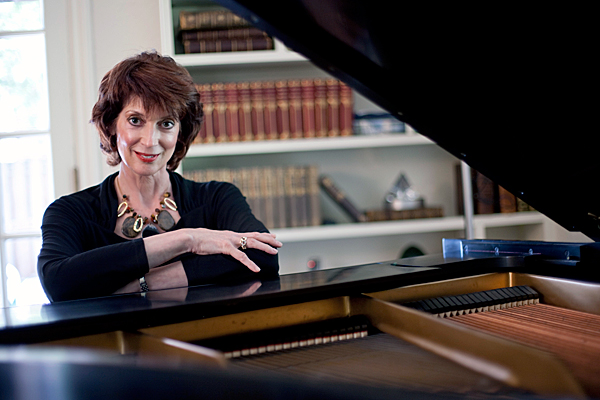Alumni Gazette
 COMPOSED: Barbara Harbach ’81E (DMA), an acclaimed classical composer, helps bring to light the music of women composers from centuries ago. (Photo: Associated Press)
COMPOSED: Barbara Harbach ’81E (DMA), an acclaimed classical composer, helps bring to light the music of women composers from centuries ago. (Photo: Associated Press)Barbara Harbach ’81E (DMA), a professor of music at the University of Missouri–St. Louis, is known in the classical music field as one of the world’s most respected and prolific “women composers.”
Women who write music are “almost always identified as ‘women composers,’” Harbach says. “And that will probably still be the case for a couple more centuries,” she adds matter-of-factly.
For the moment, however, Harbach wears the label with a certain degree of pride. She has developed not only as a composer in her own right, but as an advocate for women, as well as African-American, Mexican, and other composers whose works, Harbach argues, often go unnoticed in a field with European roots that continues to be molded in a predominantly European and male cast.
Harbach, who studied organ performance with the late Russell Saunders as a doctoral student at Eastman, built an international reputation as a keyboardist before she began writing her own music. Today she excels in both interpretation and composition, with nearly 30 CDs of solo performances to her name; four of an eventual seven CD series of her compositions, released by MSR Classics; and an upcoming premiere of her latest work, O Pioneers!, an opera based on the 1913 novel by Willa Cather.
Harbach displays an impressive range as a composer. The MSR Classics series, for example, includes works for orchestras, chamber ensembles, and solo keyboardists, as well as choral works, musicals, and film scores. Her orchestral and chamber works, in particular, have earned the adulation of Samuel Adler, a professor emeritus and her composition mentor at Eastman (or “guru,” as Harbach calls him), who noted Harbach’s “great freshness and poignancy,” and “extraordinary technique.”
If Harbach has been prolific in the past few years, it has come only after a long period in which she wrote in relative isolation. She spent most of the 1980s and 1990s as a faculty member at several small colleges far from the urban enclaves in which most classical musicians congregate. But she didn’t lack for inspiration, in part because she discovered musical “colleagues” among talented women composers who had lived and worked centuries ago.
In the mid-1980s, Harbach was researching for a performance when she encountered a brief mention of an 18th-century composer, Anna Bon di Venezia. Bon composed music for keyboards, likely written for the court of the Prussian King Frederic the Great, Prince Nikolaus von Esterhazy, and perhaps others. Yet even though she was considered a “virtuoso di musica” in her day, none of her works had ever been published. To access Bon’s music, Harbach had to send for the microfilms of Bon’s manuscripts, housed at the British Library, and endure a wait of several months for the microfilms to arrive.
That experience prompted Harbach to found Vivace Press in 1989, a musical publishing service through which she has helped bring to light the works of Bon, as well as over 30 other women and other composers whose works she has encountered and deemed underrecognized.
“The most exciting thing is discovering this music, and then discovering that it is good,” says Harbach, who recalls being told by a prominent musicologist that, “ ‘I don’t know any women composers, and if there are any, they wouldn’t be any good.’ ”
Many of these women, she points out, were considered elite in their day, studying with the likes of Mozart, Haydn, and Beethoven. Then they married, and, like Bon, who married an Italian tenor in 1767, left virtually no traces, musical or otherwise.
Harbach has been an active contributor to the St. Louis arts community since arriving in the city in 2003. She has received multiple awards from organizations such as the Missouri Arts Council for her work in spearheading Women in the Arts–St. Louis, a yearlong celebration of women composers, artists, and writers consisting of more than 800 events held around St. Louis in 2005.
Today, Women in the Arts continues under the auspices of the University of Missouri–St. Louis as Harbach juggles teaching, performing, and composing, which she says is her hardest and most satisfying task.
“For me, there is more brain strain in composing than in practicing eight hours working out trills. Yet composing is also one of the most rewarding aspects of my musical life.”
